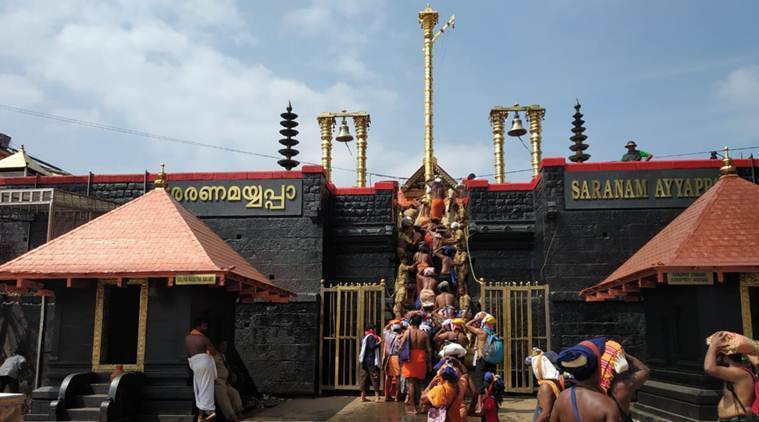 In 2018, the Supreme Court had lifted age restrictions on the entry of women to the hill shrine in Kerala.
In 2018, the Supreme Court had lifted age restrictions on the entry of women to the hill shrine in Kerala.
The Supreme Court on Monday came out with detailed reasons to support its February 10, 2020 decision overruling objections to the order referring questions of law arising out of the Sabarimala review petitions to a larger bench.
A nine-judge Constitution bench headed by Chief Justice S A Bobde which went into the various Rules and case laws said it “can refer questions of law to a larger bench in a Review Petition”.
The bench which comprised Justices R Banumathi, Ashok Bhushan, L Nageswara Rao, Mohan M Shantanagoudar, S Abdul Nazeer, R Subhash Reddy, B R Gavai and Surya Kant also held that the review petitions filed in the matter are maintainable.
Those objecting to the reference argued that the review petitions are not maintainable due to limitations in the Supreme Court Rules, 2013.
But the court rejected the contention saying the relevant provisions show that the exclusions to the general power of review “pertain only to civil and criminal proceedings”.
“Writ petitions filed under Article 32 of the Constitution of India do not fall within the purview of civil and criminal proceedings”. It pointed out. The Sabarimala verdict arose from an Article 32 writ.
Those objecting also contented that assuming such a reference can be made, it can be only after the review is granted and not during pendency of a review petition.
But the court junked this and said reference to a larger bench can be made in any cause or appeal as well as in any “other proceeding”.
“The term ‘proceeding’ is a very comprehensive term and generally speaking, means a prescribed course of action for enforcing a legal right. It is a term giving the widest freedom to a Court of law so that it may do justice to the parties in the case,” the bench said, adding that the pending review petitions fall within the purview of the expression “other proceedings”.
It added that, “no matter is beyond the jurisdiction of a superior Court of record unless it is expressly shown to be so, under the provisions of the Constitution” and that “in the absence of any express provision in the Constitution, this Court being a superior Court of record has jurisdiction in every matter and if there is any doubt, the Court has the power to determine its jurisdiction”.
The court pointed out that the order was also justified in the light of Article 142 of the Constitution which enables it “to make any order as is necessary for doing complete justice in any cause or matter pending before it”.
On September 28, 2019, the SC had by a 4:1 verdict held that the devotees of Sabarimala deity Lord Ayyappa do not constitute a separate religious denomination and therefore cannot claim the benefit of Article 26 of the Constitution of India. It also concluded that exclusion of women between the ages of 10 to 50 years from entry into the temple is violative of Article 25 of the Constitution. This was challenged by way of review petitions when the court by a 3:2 decision referred the questions of law to a larger bench.